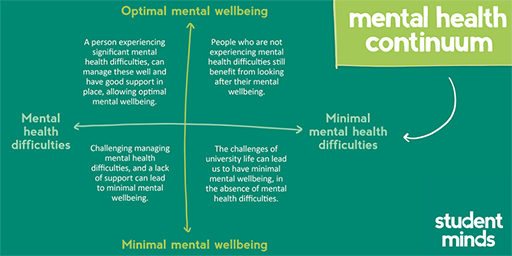2.4 Mental wellbeing or mental health: what’s the difference?
Let’s address a common question: what’s the difference between mental wellbeing and mental health?
This course tends to refer to ‘wellbeing’ rather than ‘health’, and different interpretations of the meaning of ‘wellbeing’ (mental and physical) have already been presented. It’s worth noting, however, that the terms ‘mental wellbeing’ and ‘mental health’ often get used interchangeably, and some of the resources included in this course will therefore refer to ‘health’ rather than ‘wellbeing’. The UK Department of Health explains the relationship between mental wellbeing and mental health as follows:
Mental illness and wellbeing are independent dimensions; mental health is not simply the opposite of mental illness. It is possible for someone to have a mental disorder and high levels of wellbeing. It is also possible for someone to have low levels of wellbeing without having a mental disorder.
The terms ‘mental illness’ and ‘mental disorder’ are used to describe specific, diagnosable health conditions that involve emotional, thinking or behavioural changes – or a combination of these. They tend to have persistent behavioural signs and symptoms, just as health conditions such as diabetes or heart disease have measurable physical symptoms.
Slightly confusingly, the World Health Organization actually includes the word ‘wellbeing’ in its definition of mental health:
Mental health is a state of mental well-being that enables people to cope with the stresses of life, realize their abilities, learn well and work well, and contribute to their community. It is an integral component of health and well-being that underpins our individual and collective abilities to make decisions, build relationships and shape the world we live in. Mental health is a basic human right. And it is crucial to personal, community and socio-economic development.
Mental health is more than the absence of mental disorders.
Student Minds, the UK’s student mental health charity, states that ‘mental health is based on a continuum and can fluctuate at different times’ (StudentMindsOrg, 2018). They have a useful graphic to illustrate this:
In summary, there’s no straightforward distinction between the two terms, but there’s no doubt that a person’s mental wellbeing can have a considerable effect on their mental health. Looking after your mental wellbeing, and having resources and strategies in place to support you during challenging or stressful situations, can help you avoid developing more serious mental health problems. This course will introduce some of these resources and strategies, but it will not cover mental illness in detail. If you are interested in learning more about this subject, OpenLearn has numerous free courses, which you can find by visiting the Free courses [Tip: hold Ctrl and click a link to open it in a new tab. (Hide tip)] page and typing ‘mental health’ in the search bar.
See also: Wellbeing and mental health collection.

